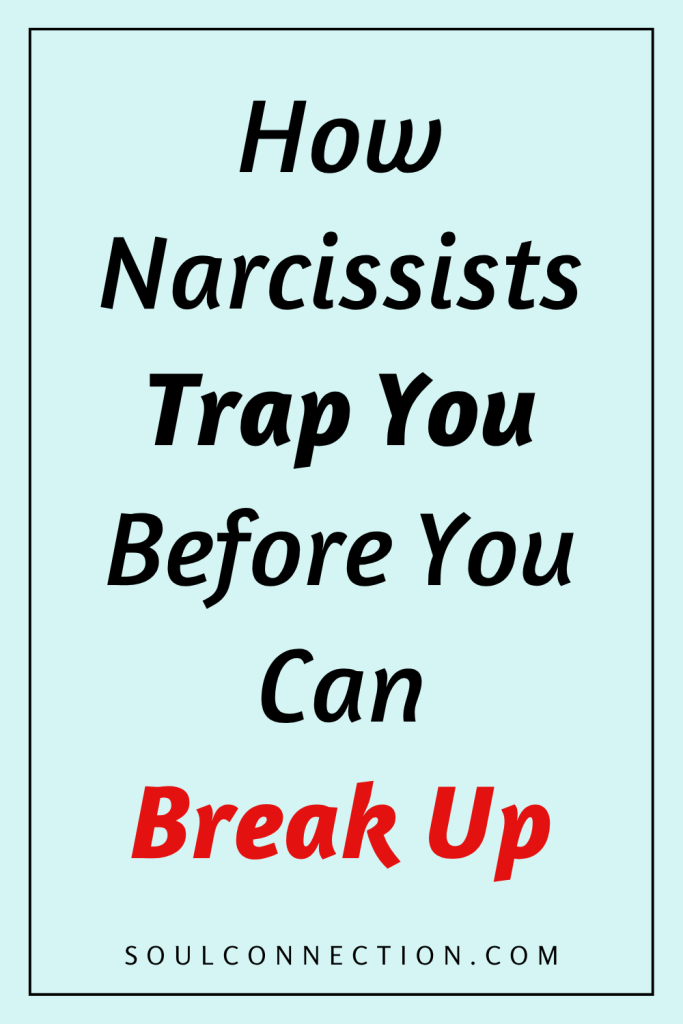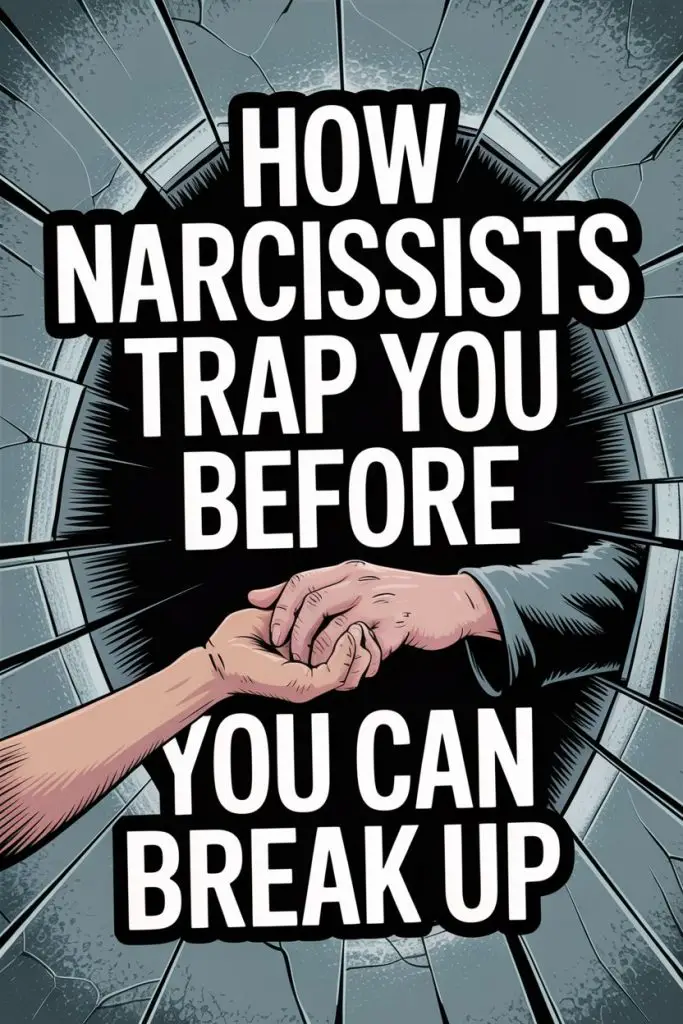People love to joke about “toxic exes,” but when the word narcissist enters the chat, the game changes.
These aren’t just your garden-variety heartbreakers; they’re emotional Houdinis who can keep you tangled in their net long after the writing’s on the wall.
Ever found yourself endlessly plotting an exit, only to leave dinner more confused than when you arrived? Welcome to the narcissist’s funhouse—where the exit signs point you right back inside.
Setting the Bait with the Idealization Phase
Narcissists don’t just trap you—they gift wrap your emotional needs, sprinkle them with charm, and serve them with a side of “I’ve never felt this way before.”
The beginning feels like a romcom montage, minus the sappy soundtrack. Their attention is intense, their compliments make you forget the laws of physics, and their declarations of soul-mate-hood are downright Oscar-worthy.
This isn’t just flattery. It’s strategic. By mirroring your dreams, likes, and even your insecurities, narcissists create a bond so intoxicating you struggle to imagine life without it.
The love-bombing is addictive, and before you know it, you’re invested, loyal, and emotionally hooked. Leaving someone who “gets” you this well? That’s not just hard—it feels impossible.
Introducing Confusion with Subtle Undermining
Once you’re reeled in and beginning to relax, the magic trick shifts. Praise gives way to tiny criticisms. “Are you really going to wear that?” Or, “You know, you’re just too sensitive sometimes.”
Nothing huge—just enough to make you tilt your head and wonder if you really are the drama.
Narcissists excel at this rinse-and-repeat dance: they alternate between warmth and coldness, keeping you guessing. This isn’t random moodiness. It’s designed to knock your confidence off its axis.
Each time you feel less sure of yourself, you rely more on them for validation—handing them the keys to your self-worth.
Twisting Reality with Gaslighting
Ever found yourself apologizing for things you can’t remember doing? Or defending your feelings like you’re in a courtroom drama? Welcome to gaslighting, the narcissist’s signature move.
They’ll question your memory, deny things you’ve both witnessed, and spin stories until you feel like you’ve wandered into an alternate universe.
The more you protest, the deeper you sink. “You’re imagining things.” “That never happened.” “You’re being paranoid.” The goal isn’t just to win the argument—it’s to make you question your grip on reality, leaving you too disoriented to confidently walk away.
Playing the Victim When Confronted
Confront a narcissist about their behavior, and suddenly you’re the villain in their tear-soaked monologue.
They excel at flipping the script: your reasonable concerns become “attacks,” and your emotional boundaries are painted as cruelty. Tears, tragic backstories, and Oscar-worthy performances appear out of thin air.
Here’s the twist: their vulnerability feels real in the moment. You pause, feeling guilt and fear of hurting them. Suddenly, you’re comforting the very person who’s been hurting you.
This emotional reversal makes it hard to follow through on leaving—the narcissist’s pain becomes your responsibility.
Isolating You from Your Support System
Loyal friends and family are a narcissist’s worst nightmare. They see the red flags you’re too enmeshed to notice. That’s why narcissists find sneaky ways to drive wedges between you and your allies.
It starts with quiet comments: “Your sister never liked me.” Or, “Your friends are jealous of our relationship.” Sometimes, they’ll engineer situations that make your loved ones seem unreasonable.
The more isolated you feel, the harder it becomes to reach out when you’re ready to leave. Who’s left to talk sense into you when the only voice you trust is theirs?
Making You Doubt Your Own Instincts
Once your support system is on mute, narcissists zero in on your self-trust. The constant drip of criticism, the spin-doctoring, the endless mixed messages—it’s all designed to make you doubt your every move.
Did you really overreact? Are you too needy? Maybe their version of events is the truth after all.
This self-doubt isn’t an accident; it’s a prison with invisible bars. When you can’t trust your own judgment, the prospect of leaving feels like jumping out of a plane with no parachute.
Better to stay where you are, right? That’s exactly what they want.
Giving Just Enough to Keep Hope Alive
Right about the time you’ve mentally packed your bags, the narcissist senses the shift. Suddenly, they’re attentive.
They remember your birthday (even if it’s two weeks late). They promise to change, swear they’ll see a therapist, and maybe even cry about how much they love you. Hope flares up again.
This intermittent reinforcement is straight out of a psychology textbook. The emotional whiplash keeps you hooked, always craving the return of those early, intoxicating days.
The good times weren’t a fluke, you tell yourself—they’re proof things can get better. And so, the cycle continues.
Guilt-Tripping and Emotional Blackmail
If all else fails, guilt comes out swinging. The narcissist reminds you of everything they’ve “sacrificed.” They threaten to fall apart if you leave, or warn you of dire consequences—sometimes even blaming you for their emotional meltdown.
Guilt is a powerful glue. Even when you know you deserve better, it whispers that you’re abandoning someone in need. Narcissists count on this.
The threat of being the “bad guy” keeps you stuck, tiptoeing around their feelings and sidelining your own.
Destroying Your Sense of Agency
Each of these tactics chips away at your ability to make independent choices. Decision-making becomes a foggy nightmare. “Is it really that bad? Am I just being difficult? Maybe everyone has issues.”
The narcissist’s voice echoes in your head even when they’re not around.
That’s the endgame: making you so unsure of yourself that leaving feels not only scary, but downright irresponsible. You’re not just trapped—the cage door is open, and you can’t even see it.
Spotting the Trap and Finding the Exit
Knowing these signs is a game changer. Not so you can win the next argument, but so you can start trusting your instincts again. Take a mental step back.
Are you constantly second-guessing yourself? Do you feel lonelier with your partner than you did alone? Are your friends worried, or have you stopped talking to them altogether?
It’s not about blame. Narcissists are experts at hiding their manipulations—and everyone gets caught off guard at some point. Give yourself credit for being self-aware enough to notice.
Then, start making small moves. Reconnect with a friend you’ve lost touch with. Start writing down the reality of your experiences. Let yourself imagine what life could be if you weren’t always walking on eggshells.
When You’re Ready to Untangle
Breaking out of a narcissist’s trap isn’t a one-and-done deal. It takes time, support, and a healthy pinch of self-compassion (and maybe some really good chocolate).
You might need to repeat your boundaries ten times before they sink in—if they ever do at all. But each step toward independence is a step away from the confusion.
If you’re struggling, reach out to a therapist familiar with narcissistic abuse. There’s no shame in needing help—narcissists are professionals at making people doubt themselves.
With the right support, you’ll rediscover your voice, your confidence, and maybe even your sense of humor.
And that’s something even the slickest narcissist can’t take away.


